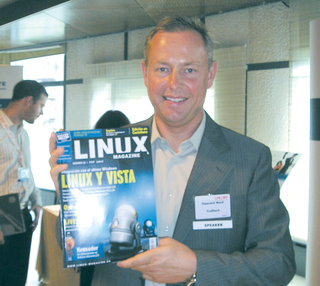
By Paul Brown
For every PC [1] in the world, there are at least three mobile phones [2], and thanks to a near 100% penetration in developed countries and massive sales in quickly developing countries such as India and China, the gap between handsets and computers on the market just keeps widening. OSiM [3] is the itinerant series of conferences that tries to address the issues of the use of open source in the mobile market. The 2007 edition of the event, held in September in Madrid, Spain, brought together industry leaders within the fields.
Although the term "open source" was used throughout the event, speakers and delegates seemed to equate the concept to "Linux." According to Christy Wyatt, Motorola's vice president of ecosystem and market development, 20% of all mobiles - especially high-end, PDA-cum-phones - are running some version of Linux. In her keynote, Wyatt said that by the end of 2008, it is expected that 60% of all handsets, both high- and low-end, will be running Linux. Symbian, the current OS of choice in the mobile market, will be gradually phased out altogether because of its proprietary nature and lack of flexibility on the new, high-power hardware that vendors are pushing.
Flexibility is also the reason Linux is preferred over competing operating systems, such as Windows Mobile. David "Lefty" Schlesinger, Director of Open Source Technologies for Access, demonstrated with their Linux stack how it was possible to give a run-of-the-mill handset the look and feel users seek with the use of style sheets alone. Apparently, this is currently impossible with existing proprietary operating systems, in which the norm seems to be one-size-fits-all.
As proof of how Linux has made headway in becoming accepted as the new de facto standard operating system for mobile devices, Schlesinger mentioned how Access had signed an agreement with Orange to create a tailor-made solution for the French operator's own phones because of Linux's power to adapt.
The other concept thrown around a lot was "fragmentation." Everybody agreed that Linux was the way to go, but which Linux? Vendor-backed stacks contain proprietary hooks that nobody is willing to free up, making it impossible for competing vendors to adopt them and unlikely that open source communities will accept them.
The agreed-upon solution was the banding together of companies to seek a common solution. But whereas Motorola pushed LiMo [4] alongside NEC, Panasonic, and Samsung, TrollTech pitched for the OpenMoko project [5], and Nokia, Access, and Wind River went their own ways - which still leaves a very fragmented market.
Organizers roped in several free software pundits to explain how to work with open source communities in a track titled "Strategic Effective Models for Development & Community Partnership." Dave Neary from Wengo, Soon San Kwon from Samsung/KLDP, and Chris Keyon from Ubuntu explained how they had managed to create a successful symbiosis with open source communities.
And then there were the legal issues. The mishing and mashing of LGPL, GPL, and proprietary licenses is not devoid of risks, and infringing on one, the other, or both sides of the fence is common practice. The track "Understanding Open Source Licensing, IPR & Industry Wide Investment" addressed the legal problems that companies face when mixing software from different sources.
Overall, OSiM 2007 was a productive event in which a lot of ground was covered and participants went home more enlightened than when they arrived.
| INFO |
|
[1] Number of PCs in the world: http://www.usagewatch.org/2005/08/how_many_pcs_ar.html
[2] Number of cellphones in the world: http://www.mobiletracker.net/archives/2005/05/18/mobile-subcribers-worldwide [3] OSiM Conference homepage: http://www.osimconference.com/ [4] LiMoF - The Linux Mobile Foundation: http://www.limofoundation.org [5] OpenMoko free open mobile platform: http://www.openmoko.com |